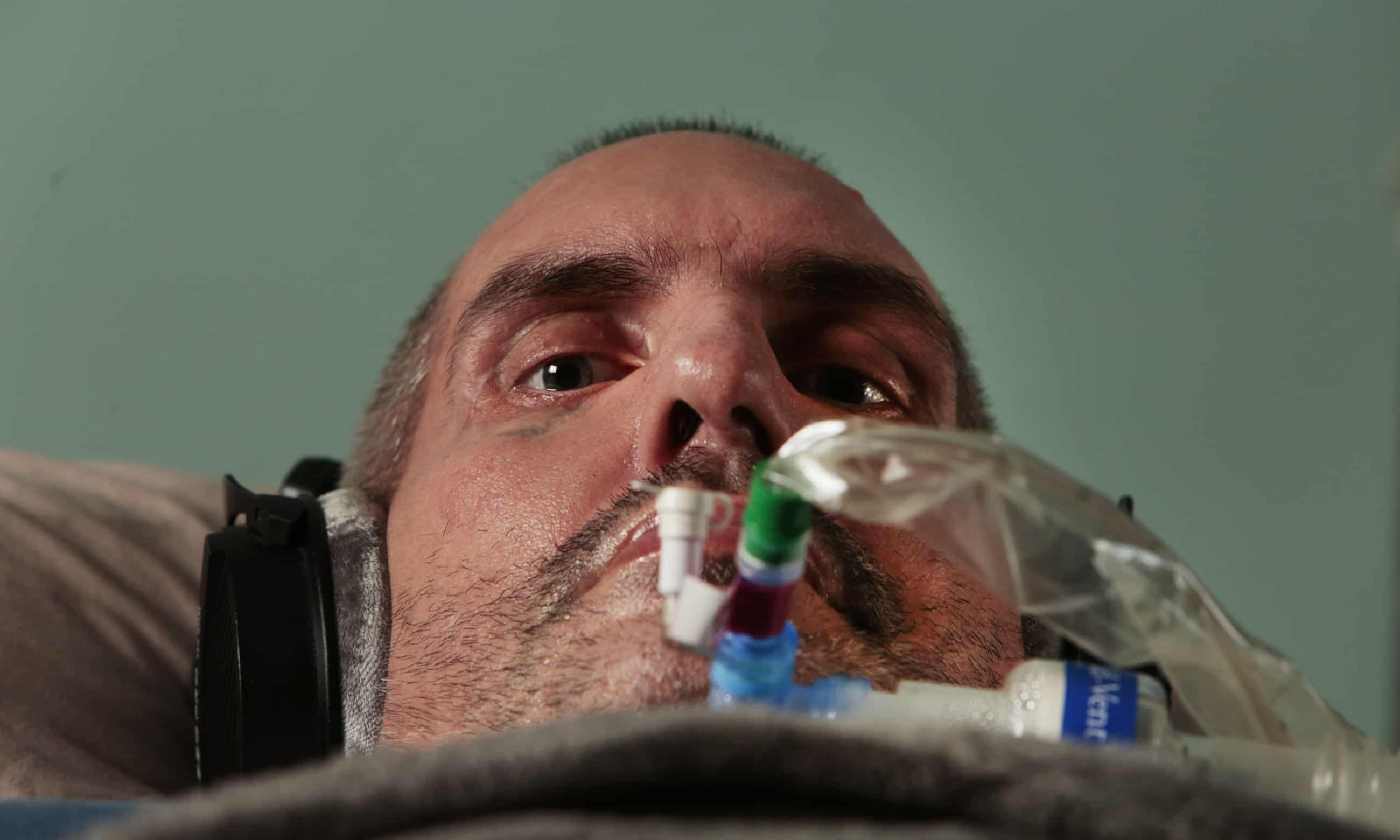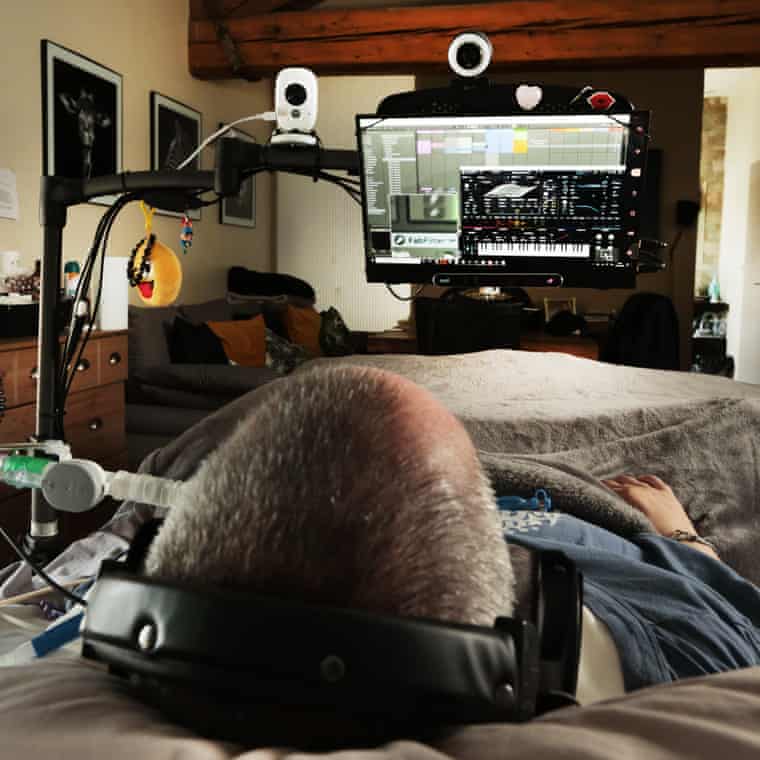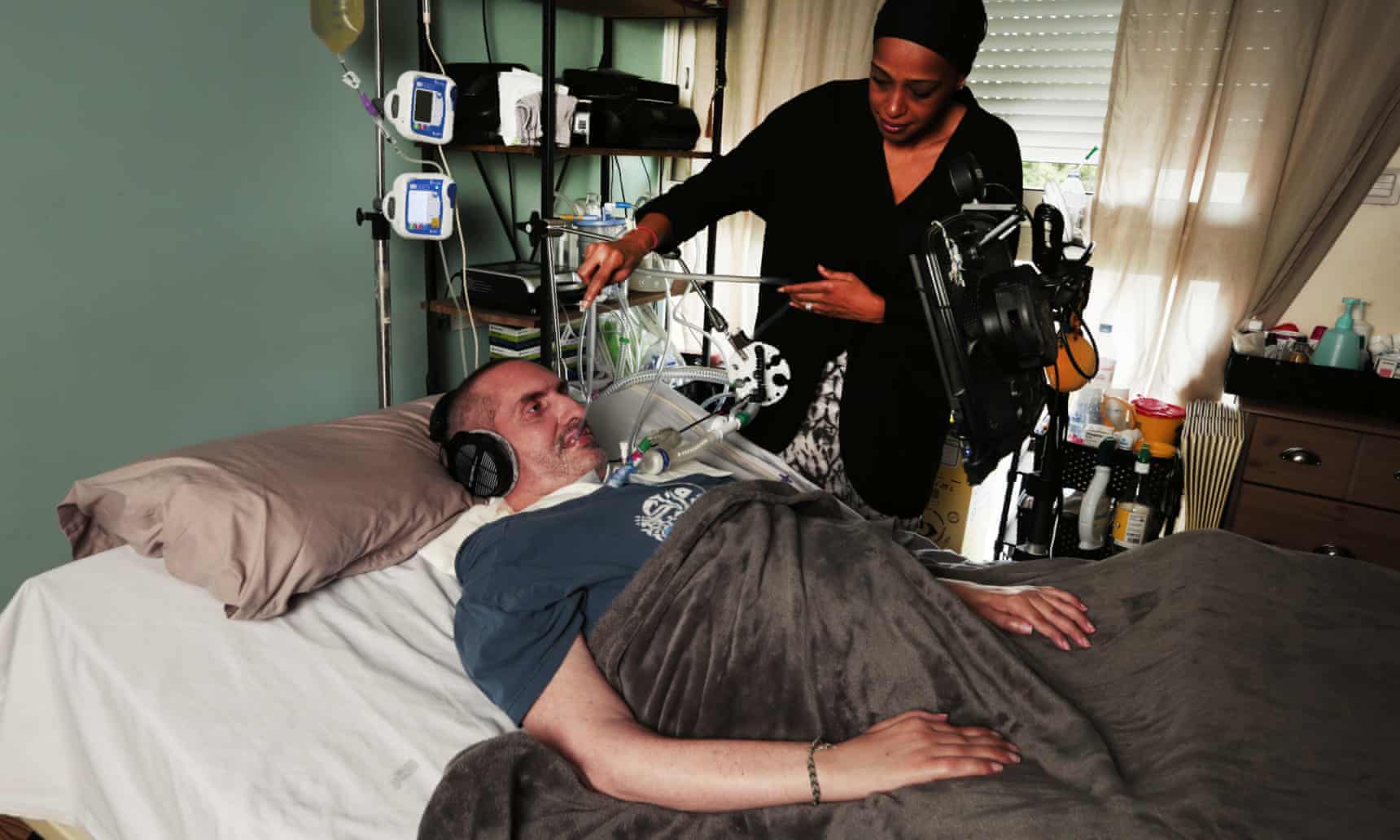
Hip-hop
Pone: the paralysed producer making music with his eyes
Motor neurone disease has left the French hip-hop artist totally immobile – yet he still found the means to compose a remarkable album inspired by Kate Bush
by Anaïs BrémondInterviewing an artist who can’t speak is an unusual, almost meditative experience. I am in a small town outside Toulouse in south-western France to meet Pone, a beatmaker who helped shape the sound of French hip-hop in the 1990s. As part of Marseille’s seminal group Fonky Family, he produced hits such as Art De Rue, Sans Rémission and the hair-raising Mystère et Suspense, as well as 113’s hypnotic single Hold Up. But we are here to discuss Kate & Me, an instrumental beat album created as an ode to Kate Bush, and the first album in history to be entirely produced through an eye-tracking device.
The silence in Pone’s bedroom is punctuated by the amplified sound of a breathing machine, his torso slowly moving up and down under a blanket, and the playful mewing of his daughters downstairs. Every so often, his wife, Wahiba, stands up from the couch at the sound of her husband’s computerised voice. “Eyes, please,” is a request to soothe his eyes with sterilised pads.
Pone, whose real name is Guilhem Gallart, is living with motor neurone disease, also known as amyotrophic lateral sclerosis (ALS), the devastating and incurable illness that disrupts the control of all the body’s muscles. Pone is irreversibly paralysed, confined to bed and unable to move anything but his eyes, his link to others only made possible through technology. But his mind, trapped inside his unresponsive body, functions as it always used to: bursting with ideas. His situation evokes that of Jean Dominique-Bauby, the fashion editor who lived with locked-in syndrome following a major stroke and wrote the memoir The Diving Bell and the Butterfly using technology controlled by the movements of his eyes.
Pone’s survivor spirit doesn’t do self-pity. Besides Kate & Me, he recently created ALS for Dummies, a self-published book that collects his articles about this unjustly under-represented condition, aimed at sharing vital information with other people who have motor neurone disease. (The ice-bucket challenge of 2014 was intended to raise awareness of the condition.)
The book is written with urgency and humour. Pone ironically refers to 2016 as the year he “won the Mannequin Challenge”; the following year, before a gastrostomy operation – which introduced a hole in his abdomen to enabled him eat – Pone told his doctor: “I’m Muslim, so no pork in the tube feeding, right?” In a recent Facebook post, he thanked his illness for his recent period of creativity. “I would never have done all this if I didn’t get sick,” he wrote. “Thank you ALS, you woke me up!”
To refer to his pre-motor neurone life as sleepy is characteristic of Pone’s humility; his career was far from slumbering. Fonky Family rose to fame in 1994 when they featured on the song Bad Boys de Marseille, by Akhenaton of the group IAM. With its glorious Eddie Kendricks bassline, the voluble MCs’ distinctive Mediterranean accents and the video’s nod to the French Connection drug trade, the song became a summer hit and catapulted the group into the limelight.
Three albums and sold-out tours later, the Fonky Family called it quits. Pone and Wahiba married and moved out of Marseille with their two daughters. In 2014, Pone began to experience trouble walking, and soon found out he had motor neurone disease. The news dropped like a bomb in his family life: nothing could prepare them for the rapidity with which he would become tetraplegic. The worst part was becoming mute. For a while, he could only communicate through a spelling card. Wahiba would patiently run her fingers over the letters, stopping when Pone would blink. Together, they would slowly form sentences. “It was horrible,” Pone remembers.

After watching a documentary on Stephen Hawking, who also had motor neurone disease, Pone’s family were inspired to research speech-generating devices. They tracked down the software Hawking himself had created, and soon Pone had a screen permanently placed in front of him, under which a small device mapped his gaze precisely. This eye-tracking technology, Wahiba says, is “open to anyone; some geeks use it just for the hell of it”. Thanks to this tool, Pone could start to write sentences that his computer would read out loud. His melodious southern French accent was lost in the process, but it was enough to translate his thoughts to the outer world.
The relief Pone felt was huge, but it was bittersweet. French state healthcare doesn’t make information about eye-tracking technology readily available, nor does it cover the costs, a fact that he and Wahiba vehemently criticise. State-funded centres for motor neurone disease, he says, “are totally out of the loop”, forcing many concerned families to find makeshift solutions. My own family experienced this reality first-hand; my mother was locked-in due to multiple sclerosis. A website such as ALS for Dummies, written by patients for patients, could have changed her life.
By early 2019, Pone had acclimatised to his new life and felt the urge to make music again. With Ableton Live installed on his computer, he began to use his eyes to operate like a mouse: he could do everything he used to, just at a slower pace. He was so energised by this new possibility that he decided to work with material by Kate Bush, an artist he first heard on samples in the late 90s and had long worshipped for her “singular originality and own sampling work with Peter Gabriel”, he says. “And her voice, of course.”
Pone embarked on creating Kate & Me from his bed. Patiently working with his cat on his lap, he distorted and extended Bush’s vocal in Wuthering Heights for his opening track. He recorded the sound of his own breathing machine and interlaced it with the melody and powerfully symbolic lyrics of her song Breathing. He weaved piano samples from Bush’s back catalogue with echo-drenched rap vocals, putting her in eerie conversations with artists such as Jay-Z, Styles P and Biggie Smalls.

The result is an emotional, spacious record with a sci-fi quality. With trademark optimism, Pone says he “wasn’t limited” while producing it. “Rather the opposite. I was able to try new techniques. Before, it was way more immediate; now the process is really slow, but I use this time to properly think about the music.” I am intrigued by the final song, the 30-minute Loin de Tout ça: an icy, cavernous and seemingly endless vocal taken from Under the Ivy, the B-side to Bush’s 1985 single Running Up That Hill: “When we work, us beatmakers, we often hear the same loop for hours,” says Pone. “It really transforms our perception of sound, it immerses you in a different world. This is why I extended the track so much. This is the experience I wanted to share.”
In August last year, Pone finished Kate & Me and released it online for free (a physical version is now available in France). When he’s not imparting his encyclopaedic knowledge of soul, US and French rap in carefully written blogposts, he is actively promoting Kate & Me on social media – to an awestruck response.
If the real success of Kate & Me is how it represents the possibilities for people living with motor neurone disease, the recognition also has fuelled Pone’s ambition to work with MCs again. When I ask him if he has any projects on the go, his smiling eyes confirm my guess. “I have a passion project with another old fart like me,” he says. He dreams of collaborating with Drake or A$AP Rocky. What about Bush herself? He hopes she isn’t too upset that he took liberties with her work, but he doubts whether she has listened to the album. “It seems like she’s untraceable. She’s probably making marmalade in the depths of the Scottish Highlands.” Pone, meanwhile, is making lemonade from life’s lemons.